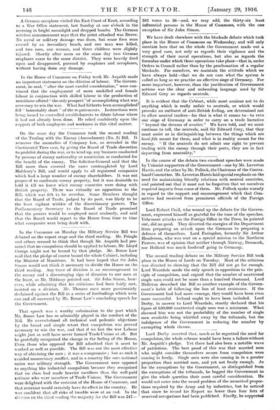That speech was a worthy culmination to the part which
-Mr. Boner Law has so admirably played in the conduct of the Bill. He overwhelmed all technical and pedantic objections by the broad and simple retort that compulsion was proved necessary to win the war, and that if we lost the war Labour might just as well have never formed Trade Unions at all. But he gratefully recognized the change in the feeling of the House. Even those who opposed the Bill admitted that it must be worked as well as possible. The Bill was not the most effective way of obtaining the men ; it was a compromise ; but as such it avoided unnecessary conflict, and in a country like ours national union was military strength. The Government were opposed to anything like industrial compulsion because they recognized that no class had made heavier sacrifices than the well-paid artisans who were members of Trade Unions. The Government 'were' delighted with the restraint of the House of Commons, and that restraint would certainly have its effect in the country. He was confident that all risks of trouble were at an end. In the division on the third reading the majority For the Bill was 347— 383 votes to 36—and, we may add, the thirty-six least influential persons in the House of Commons, with the one exception of Sir John Simon.


















































 Previous page
Previous page